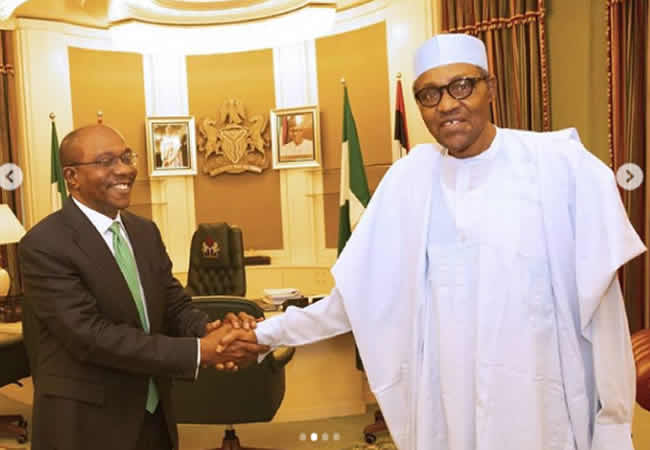The International Monetary Fund (IMF) team on a visit to Nigeria has blamed the FG’s “over-optimistic revenue projections” as the main reason the CBN’s lending to the FG continues to increase at an alarming rate. This is contained in a press release published on its websites following a visit by the team of experts. The summary includes commentary and preliminary findings from its staff.
On the gloomy economy: Just as most analysts opine, the IMF Team believes the uncertainty in Buhari’s economic policies has exacerbated economic hardship for Nigerians while keeping foreign investors away from investing in the real sector. It opines this is one of the key issues affecting fast-paced economic recovery.
“The pace of economic recovery remains slow, as depressed private consumption and investors’ wait-and-see attitude kept growth in the first half of the year at 2 percent, a rate significantly below population growth.”
It, however, acknowledged that the inflation rate has fallen due to lower food price inflation though it might rise again if major reforms, like an increase in VAT, are passed next year and an increase in the minimum wage.
“Headline inflation has fallen, reaching its lowest level since January 2016, helped by lower food price inflation…… Inflation will likely pick up in 2020 following rising minimum wages and a higher VAT rate, despite a tight monetary policy.”
CBN Lending: The team highlights the increasing reliance on CBN loans to the Federal Government, helping the latter fund its huge revenue deficits amidst over-optimistic projections.
“Carryover from 2018 to 2019 helped increase public investment spending in the first half of 2019, but revenue underperformed significantly relative to the budget target in the first half of 2019. Over-optimistic revenue projections have led to higher financing needs than initially envisaged, resulting in overreliance on expensive borrowing from the CBN to finance the fiscal deficit. Federal Government interest payments continue to absorb more than half of revenues in 2019.”
By continuing to rely on the CBN to finance its expenditure (mostly recurrent) the government puts the economy in dire straits as it creates a hole that may not be immediately closed if government revenues continue to be lower than expected. The IMF also called for a tight monetary policy based on “conventional tools” and requested for initiatives that can increase revenues without having to always rely on CBN handouts.
“The increasing CBN financing of the government reinforces the need for an ambitious revenue-based fiscal consolidation that should build on the initiatives laid out in the Strategic Revenue Growth Initiative. A tight monetary policy should be maintained through more conventional tools. Managing vulnerabilities arising from large amounts of maturing CBN bills—including those held by non-residents—requires stopping direct central bank interventions, the introduction of longer-term government instruments to mop up excess liquidity and moving towards a uniform market-determined exchange rate.”
On current account deficits – The IMF also touched on Nigeria’s growing current account deficits which Nairametrics reported last week as fanning devaluation flames. It, however, indicated that the exchange rate has remained stable due to the CBN’s continuous intervention in the I&E window.
“Spurred by one-off increases in imports, the current account turned into a deficit in the first half of 2019 after three years of surpluses. Gross international reserves have fallen to below $42 billion at end-August 2019, mainly reflecting a decline in foreign holdings of short-term securities and equity. The exchange rate in various windows remained stable, helped by steady sales of foreign exchange by the Central Bank of Nigeria (CBN).”
The current account deficit occurs when a country’s foreign liabilities exceed its foreign assets. It is exacerbated when the country imports more than it exported. The IMF Team expects the deficit to persist.
“The current account’s shift to a deficit is expected to persist while the pace of capital outflows continues to weigh on international reserves. Inflation will likely pick up in 2020 following rising minimum wages and a higher VAT rate, despite a tight monetary policy.”
On Outlook for 2020: The IMF Team opines that even though the growth of 2.3% is expected this year based on increased activities in the Agric sector and recovery in the oil sector, it also supported the FG’s planned increase in VAT
“The outlook under current policies remains challenging. Growth is expected to pick up to 2.3 percent this year on the strength of a continuing recovery in the oil sector and the regaining of momentum in agriculture following a good harvest. Revenue initiatives planned under the 2020 budget—including a VAT reform that increases the rate, introduces a minimum registration threshold and exempts basic food products—will help partially offset declining oil revenues and the impact of higher minimum wages, thus keeping the overall consolidated fiscal deficit elevated.”
